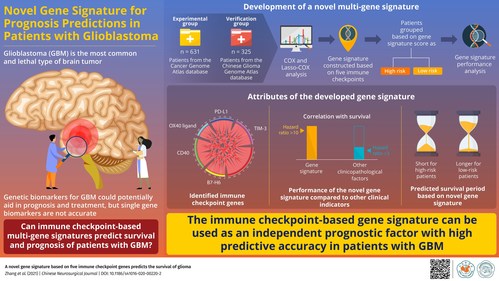The article describes a novel gene signature based on immune checkpoints that can accurately predict the prognosis and survival in patients with glioblastoma
BEIJING, May 27, 2022 /PRNewswire/ — Early predictions of the prognosis of glioblastoma (GBM)—one of most lethal cancers affecting the brain—could potentially improve the survival outcomes of patients. Molecular pathology is considered a promising tool for such predictions; however, the prediction accuracy of single genes or signatures is low, suggesting the need for multi-gene analysis.
Research suggests that low immune activity in GBM is characteristic of poor prognosis and results from an imbalance between certain immune checkpoints. Recently, a research team led by Professor Tao Jiang from the Capital Medical University, Beijing, developed a gene signature based on five immune checkpoint genes to accurately predict the prognosis of glioma. The study was made available online on February 3, 2021 in Volume 7, Issue 15 of the Chinese Neurosurgical Journal.
For their study, the team enrolled 631 patients of the Cancer Genome Atlas (TCGA) and identified 16 immune checkpoints that were statistically relevant to GBM prognosis. Of these, they selected five checkpoints based on COX and Lasso-COX regression. They used these genes to develop a novel gene signature. They then calculated the signature for the 631 patients in the experimental group, along with 325 patients from a verification group, who were enrolled from the Chinese Glioma Genome Atlas (CGGA). Patients from both groups showed a positive relationship between the signature and the immune system process
They then sub-grouped the patients as high- and low-risk based on their signature scores. They found that the high-risk patients had significantly worse prognosis. "The poor prognosis for patients in high-risk group points to the relationship between tumorigenesis and immune checkpoints," states Prof. Jiang. Moreover, they saw that the signature was highly related to biomarkers of immune response. They also found that the signature was unrelated to chemo- or radiotherapy, indicating that the signature influenced only prognosis, not treatment.
According to Prof. Jiang, "The gene signature can not only predict the prognosis of GBM, but also guide the development of multi-immune checkpoint blocking therapy and clinical detection kits in the future."
Here’s hoping that this novel gene signature can bring some much-needed respite to patients and healthcare professionals tackling glioblastoma!
Reference
Title of original paper: A novel gene signature based on five immune checkpoint genes predicts the survival of glioma
Journal: Chinese Neurosurgical Journal
DOI: https://doi.org/10.1186/s41016-020-00220-2
About Chinese Neurosurgical Journal(CNJ)
Chinese Neurosurgical Journal is an open access, peer review journal publishing work in all areas of neurosurgery, including new trends in neurology and neuroscience, with a focus on clinical practice and techniques.
Online Submission: https://www.editorialmanager.com/chnj
Home page of CNJ: http://cnjournal.biomedcentral.com/
Media Contact Information
Yi Lu
Email:
337318@email4pr.com
State of Origin: China
Telephone: 010-59978478
SOURCE Chinese Neurosurgical Journal


